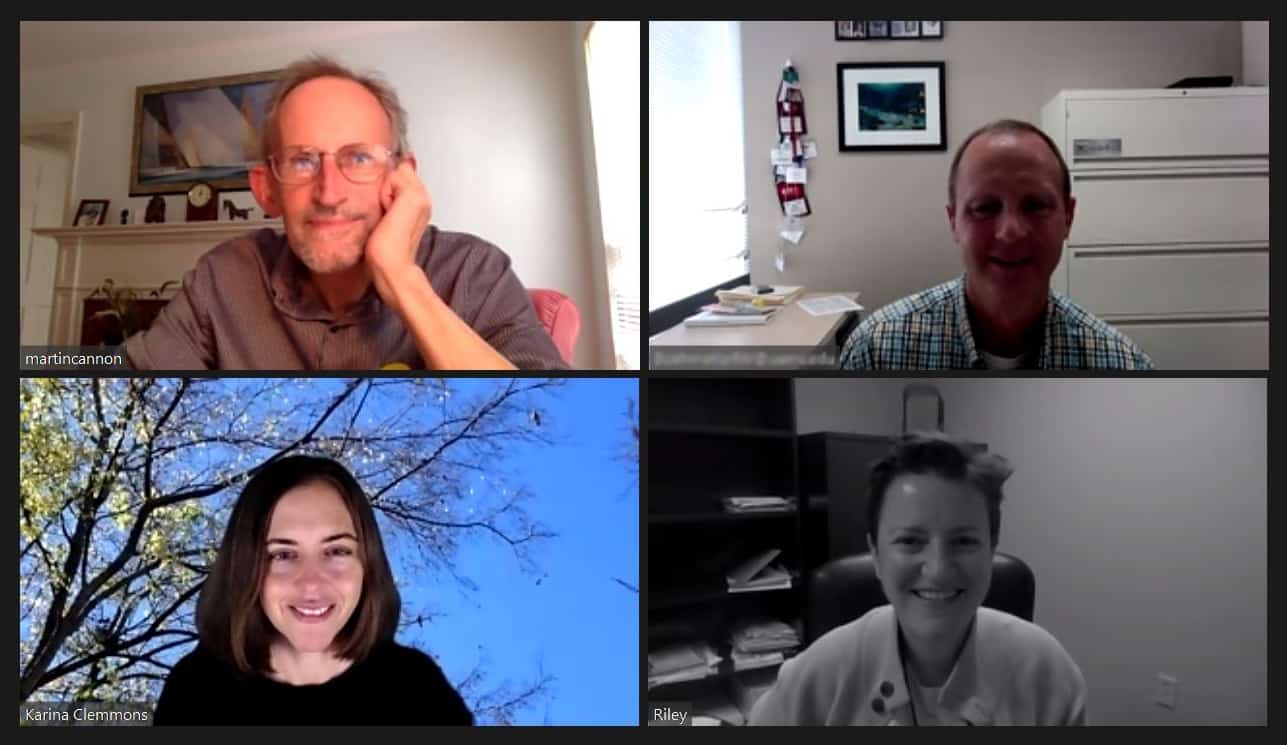COVID-19 Course for Medical Students Published for International Audience
| Imagine teaching a class while using a new technology and the details of the lesson keep changing right up until the last second – all while student and teacher alike are experiencing massive disruptions in their personal lives.
The professors at UAMS tasked with teaching the online COVID-19 course for the year three and year four (M3 and M4) medical students don’t have to imagine it. They lived it.
Now their insights, “Building Up While Shutting Down: An Academic Health System Educational Response to the COVID-19 Pandemic,” have been published in the journal MedEdPublish. Karina Clemmons, Ed.D.; Karl Boehme, Ph.D.; Martin Cannon, Ph.D.; James Graham, M.D.; and Riley Lipschitz, M.D., of the UAMS College of Medicine are co-authors and were co-pilots on this wild ride.
“We were building the plane as we flew it in the most literal way,” Lipschitz said. “It was an incredible and special experience because everybody was willing to say, ‘you know, I’m not sure that this is going to work, but we’re going to try it.’ Everyone leveraged their best while being incredibly innovative in the face of some really serious challenge and uncertainty.”
Cannon said the course was anything but conventional.
“It was all built on a rolling basis,” Cannon said. “We didn’t necessarily know what we were doing 48 hours ahead. We managed to just keep abreast of it. We didn’t have the luxury of presenting material where the science was established, part of the record. Quite the contrary: everything was evolving in real time and continues to do so. We’ve been updating it ever since.”
Clemmons – an associate professor in the Department of Medical Humanities and Bioethics, assistant dean for undergraduate medical student education and director of curriculum evaluation improvement – helped design the course and its various iterations. She then surveyed the students who participated in the well-received course. The resulting publication may be the first reported description and corresponding evaluation of the educational content of such a course in a medical school setting.
Clemmons brought the educational expertise to the team. Boehme, an associate professor, and Cannon, a professor, are experts in infectious disease and microbiology, respectively, housed in the Department of Microbiology and Immunology. Graham is trained in pediatrics and has many years of educational experience in the College of Medicine, including serving as executive associate dean for academic affairs. Lipschitz is a practicing internist. To teach the course, they called on many others from on campus and off.
“Many people agreed to help by giving lectures or hosting fireside chats,” Lipschitz said. “Clinicians, educators, infection control experts, diversity experts – they were all willing to devote time to our students or share information with us that we could use for the course. We were blown away during the whole process by everyone’s willingness to put forth such an unusual and heroic effort during what were honestly scary times with a lot of unknowns.”
The COVID-19 course may have started with M3 and M4 students, but has since spread in various forms across campus. There is even a public version so health care providers across Arkansas have a trusted resource from UAMS.
“I was really honored to collaborate with so many dedicated and talented individuals to bring this course to the College of Medicine students, to other learners and residents, to the Graduate School, to the public, and now ultimately through this publication, to a broader international medical education audience,” Clemmons said. “To me, this is proof of concept that medical education can be both highly interdisciplinary and innovative, even in a short amount of time and difficult circumstances.”
The course is unique in that it did not just cover the basic science and clinical protocols. The course directors chose to provide students with the wider picture, including topics like public health, the epidemiology of pandemics, disease control and social determinants of health, especially as it quickly became clear that the virus was disproportionately impacting communities of color.
“These aren’t topics that medical students are accustomed to encountering in their courses, but we felt it was important for them to understand,” Cannon said. “These are the factors influencing the world that they are about to step into and begin practicing medicine. These are the factors impacting their patients. They didn’t always understand the value at first, but by the end of the course the surveys show that they came to appreciate our attempt to provide them with the big picture.”
UAMS medical students were sent home March 12 after the first COVID-19 case was reported in Arkansas on March 11. While College of Medicine leadership shifted college functions to remote versions almost overnight, the COVID-19 course team was assigned its task. They readied the course in about three weeks, eager to maintain a connection with students who were suddenly in limbo at home, alone to study for important exams that could determine the course of their careers while watching with anxiety as testing dates across the country were canceled.
Clinicians at UAMS and everywhere were scrambling to understand the best protocols for treating a new disease, and the M4s were about to graduate into this new world as practicing physicians in a few short weeks, but they were no longer on rotations and didn’t have personal experience practicing medicine in the new COVID-19 reality.
“It felt especially important to give them as much information as quickly as possible, while also providing them with a wider context of the world they were entering into,” Lipschitz said.
To view selections of the course material made available for the public, click here.
